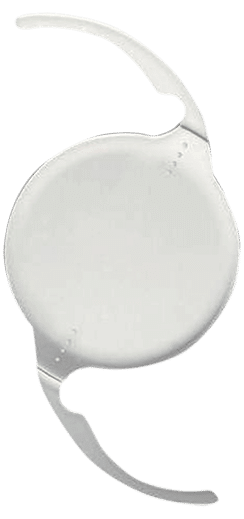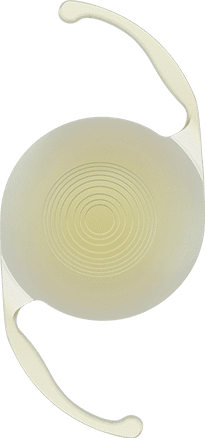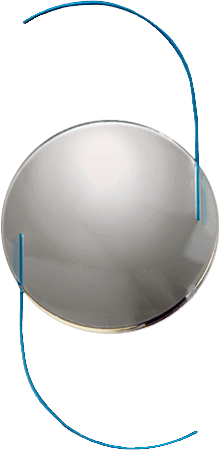Premium Lens Options
In addition to standard intraocular lenses, there are a variety of lenses available which can further reduce or eliminate the need for glasses after cataract surgery. Every patient at Cape Fear Cataract & Cornea undergoes extensive cataract testing and careful measurements of the eye. Our team will develop a customized treatment plan specific to you and your doctor will review with you the lens options which are best suited to your eyes and your lifestyle.
Toric Intraocular Lenses: (Astigmatism Correcting)

Correcting Astigmatisms With Intraocular Lenses
Many eyes have an astigmatic shape. Much like a football surface has two curves in comparison to a basketball surface which has only one uniform curvature, an eye with astigmatism has more than one shape of optical curvature. This bends the incoming light in one direction more than the other direction. The result is blurring of images at all distances unless corrected by glasses, contacts, or surgery. Astigmatism is now routinely corrected simultaneously with cataract surgery.
Treatment For Astigmatism with a Toric IOL
Most degrees of astigmatism are best treated with a toric lens implant. The power of the implant is selected to match the astigmatism of your eye. We offer the newest toric IOL offerings from the top brands such as Johnson & Johnson, Alcon, and Bausch & Lomb.
There are two main types of toric intraocular lenses: standard or multifocal. A standard toric IOL would reduce the astigmatism and provide sharper vision at a single distance. Multifocal toric lenses can further reduce the need for reading glasses as we will describe in the section below.
Treatment For Astigmatism with Laser
Lower amounts may be treated with precise astigmatism correcting laser incisions using the Catalys Femtosecond laser.
Multifocal Lenses: Youthful Vision for Cataract Patients

Replacing a patient’s cataract-clouded natural lens with an artificial intraocular lens has long been an incredibly successful surgery that delivers amazing vision improvement. But there used to be only a single decision to make. Patients would decide whether they wanted their replacement IOLs to focus on distance vision or up-close vision. The patient would then use eyeglasses to correct for the other vision range.
That all began to change in the late 1990s with the debut of the first generation of multifocal IOLs. These technologically advanced lenses now allow for a clear vision at a variety of distances, from up close to distance. In the 35 years since that debut, technology has continued to evolve. Today, there are a variety of options for excellent vision with cataract replacement IOLs. Many of the newest lenses can now bring distance, intermediate and near objects into focus.
What Are Multifocal Lenses?
Modern multifocal lenses represent breakthrough technology because of their unique optic design which may allow patients to experience the highest level of freedom from glasses. These lenses have different rings or zones that bring objects into focus at different distances. The most advanced are trifocal lenses which can give excellent distance, intermediate, and near vision.
Advantages of Multifocal Lenses
Multifocal lenses produce the widest range of vision without glasses following surgery. Our goal with these lenses is to allow you to see at most distances without glasses. This means you won’t have to constantly have glasses with you to correct for whichever option you chose not to correct with monofocal IOL. While these technologies are not covered by insurance, most patients feel the benefits of these IOLs are worth the extra cost.
What Are The Disadvantages To Multifocal IOLs?
The risks involved with these technologically advanced IOL options are the same as with all cataract surgeries. But these are incredibly low-risk procedures. In fact, cataract surgery is the most successful surgery performed around the world.
With a multifocal IOL, distance, intermediate, and up-close vision are very good, but there is no perfect lens. Small print and dim light conditions can create a situation where reading glasses are still needed. Also, about one-quarter of multifocal IOL patients notice glare and halos around lights at night. This can interfere with the person’s ability to drive at night. Most patients, however, find that they get used to this phenomenon with time and the glare and halos become less obvious. It should be noted that this doesn’t occur only with multifocal IOLs: 7-8 percent of patients with monofocal lenses also have glare and halos. Specific results cannot be guaranteed and some patients may still require a light pair of glasses for fine focus.
Results of Multifocal Lenses
During some of the clinical trials in the US, the results were impressive:
- Nearly 9 out of 10 patients never wear glasses
- Nearly 90% of patients are able to function comfortably without glasses at all distances
- Nearly 94% would choose to have the procedure done again
What Are Extended Depth of Focus (EDOF) Lenses?
While multifocal lenses provide 3 zones for distance, intermediate, and near vision, Extended Depth of Focus or EDOF lenses provide a smooth continuation of focus from distance to intermediate. This results in better low light performance than many multifocal lenses, but the near focus is farther away than with a multifocal lens.
Light Adjustable Lenses
What is a Light Adjustable Lens?

The light adjustable lens is the first intraocular lens that is truly customized to your vision. It is called a light adjustable lens because the doctor uses ultraviolet light to adjust the prescription of the lenses once your eyes have healed after cataract removal surgery.
How Does a Light Adjustable Lens Work?
Light adjustable intraocular lenses are made using photo-sensitive material that responds to ultraviolet light. After cataract removal surgery, the light adjustable lenses that have been placed are treated with ultraviolet light, which alters the shape of the lens to perfect your vision. The light treatment that shapes the new lens is completely painless and takes less than five minutes. There are a minimum of 3 treatments and a maximum of 5. During treatment time, special sunglasses must be worn and these will be given to you at the time of surgery.
Who is an Ideal Candidate for Light Adjustable Lenses?
The light adjustable lens is made from material that is suitable for nearly every patient. In particular, some patients have a unique shape to their eye which creates some difficulty selecting the intraocular lens power before surgery. Patients who have had previous eye surgeries fall into this category. They make excellent candidates for the LAL because we can adjust the lens power after the fact to further reduce the need for glasses after surgery.
What Makes a Light Adjustable Lens Different from Other Lens Options?
As advances have been made in the field of ophthalmology, we’ve been granted better and better lens replacement options. The light adjustable lens is one more option to add to an already-impressive list, and it’s a big jump up from the next best lens! In a standard cataract removal process, the doctor measures your eye the best they can and determines which IOL may be best for you. This IOL will be pre-set with its magnification before surgery. Using the light adjustable lens, the customization occurs after surgery, after your eyes have completely healed and are no longer clouded by cataracts. In this process, there is no guesswork. Your light adjustable IOL is customized two weeks after your cataract removal surgery using light and your eyes’ natural shape to guide the ideal magnification.
Are there any Risks with Light Adjustable Lenses?
Cataract surgery and the placement of any IOL comes with certain risks. After receiving a light adjustable intraocular lens, you must be diligent in following your aftercare instructions. In particular, you must wear the eyewear given to you by Dr. Groat. These special eyeglasses protect your new lenses from daylight, allowing for the most accurate adjustment when you return to the office. Complications can occur if your new lenses are not properly protected as outlined in your post-op instructions. If you have questions at any time, please contact our office for assistance.

How Do I Know Which Intraocular Lens Will Be Right For Me?
At Cape Fear Cataract & Cornea, we love educating our patients about the different options we now have with cataract surgery. There are differences between toric, multifocal, EDOF, and light-adjustable IOLs that can be discussed to reduce your need for spectacle correction following surgery.
But you really can’t go wrong with ANY choice. Standard, basic, lenses provide excellent vision and we counsel patients about expected eyeglass wear following surgery.
Patient Testimonials
“Dr. Groat is a very special person and surgeon. Dr. Groat has the ability to explain complex medical terms in everyday English and he wants you to understand your individual sight problem before your surgery.
His skills go so far beyond being an excellent surgeon. I had no discomfort during or after surgery. I have 20/20 vision at 66 years old. His office staff is a group of amazing folks that only a great doctor could acquire.”
“So very pleased! I was apprehensive about having cataract surgery because I consider my eyesight to be my greatest asset. Dr. Groat and his staff were superb with the entire process. Having cataract surgery was quite easy and totally comfortable and I am amazed with the clarity of detail that I can now see. I will recommend Dr. Groat to everyone. He is an outstanding surgeon.”
– P.B.
“I couldn’t be happier with my outcome following cataract surgery. I have worked with a number of cataract surgeons in my career of ophthalmology but Dr. Groat is the absolute best!”
– C.P.
Schedule Your Consultation at Cape Fear Cataract & Cornea Today!
Call our office in Wilmington, NC at 910-769-4590 or click the button below to schedule your consultation for cataract removal and to learn more about light adjustable lenses.
Request an Appointment“Excellent physician! I feel very comfortable with him taking care of my eyes. He is a honest physician. Staff and office is wonderful! I would highly recommend him for all your eye needs!”
“I moved to Wilmington 4 years ago and found Dr. Groat when I had an eye emergency. His precision and efficiency is undeniable. He has an existentive medical background that made me feel comfortable + his team is so sweet, they really made my experience bearable. I’ve been going back every year for eye exams!”


